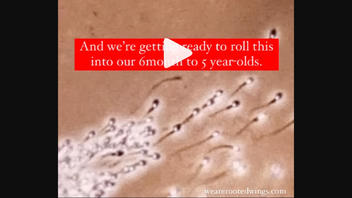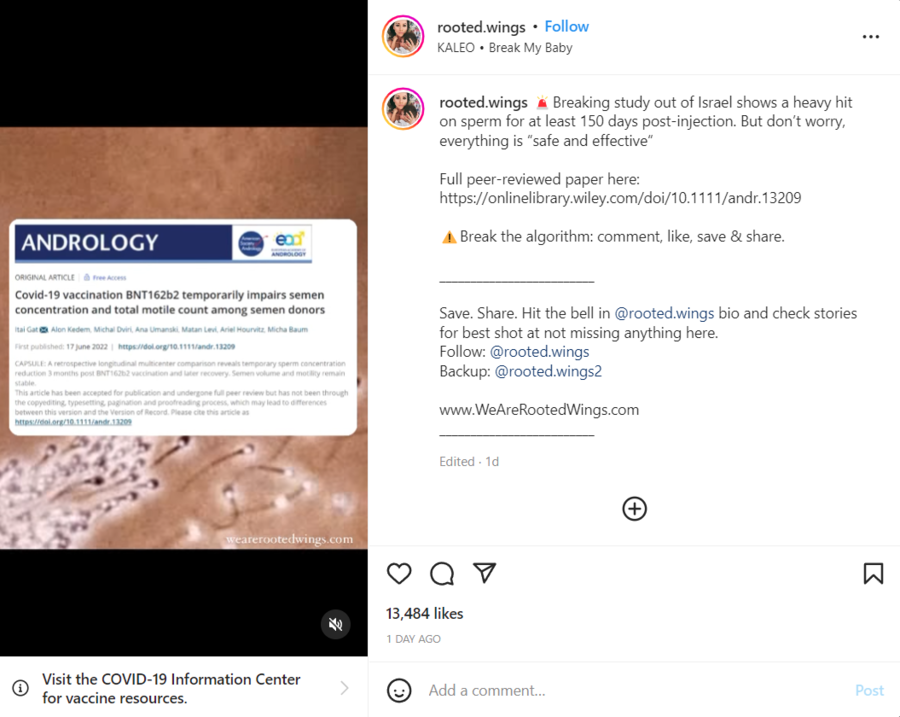

Does the Pfizer COVID-19 vaccine have a long-term impact on the production of sperm? No, that's not true: The shot temporarily lowers sperm count, much the same as after a "simple viral infection," according to Itai Gat, one of the authors of a study published June 17, 2022, that looked into the connection. The Centers for Disease Control and Prevention (CDC) also said it "detected no unusual or unexpected patterns of reduced sperm count in men following immunization."
The claim appeared in an Instagram post on June 19, 2022, under the title "Breaking study out of Israel shows a heavy hit on sperm for at least 150 days post-injection. But don't worry, everything is 'safe and effective.'" The video with the post opens with a screenshot of the title of the published study:
Covid-19 vaccination BNT162b2 temporarily impairs semen concentration and total motile count among semen donors
The text with the video continues:
Full peer-reviewed paper here: https://onlinelibrary.wiley.com/doi/10.1111/andr.13209
⚠️Break the algorithm: comment, like, save & share.
This is what the post looked like on Instagram at the time of writing:
(Source: Instagram screenshot taken on Tue Jun 21 15:52:35 2022 UTC)
Gat is one of the authors of the study linked and highlighted in the post called "Covid-19 vaccination BNT162b2 temporarily impairs semen concentration and total motile count among semen donors." In a June 22, 2022, email to Lead Stories, he summarized their findings:
We found a temporary decline in sperm concentration specifically 3 months after vaccination (first 2 doses). It makes sense since sperm production in humans lasts around 74 days. Therefore, the impact of every intervention in sperm production (ex. Hormonal treatment for subfertile men) will be observed after 3 months.
That impact is very similar to simple febrile disease (ex. Flu), so we assume that this decline is related to immediate immune response post-vaccination.
I don't think these findings change the general picture regarding vaccinations. We already know they may cause immediate immune responses such as fever and fatigue for a few days. Our study demonstrates its consequence on sperm production, which is temporary.
In other words, since men would not be concerned about their fertility after a simple viral infection, the same is true for the vaccination effect.
The study was published in Andrology, which is the official journal of the European Academy of Andrology and the American Society of Andrology, with the field of andrology focusing on the male reproductive system.
In a June 21, 2022, email to Lead Stories, Dr. John Su of the CDC's Immunization Safety Office said the agency has found no reason for concern:
The CDC does not generally comment on specific articles. However, CDC has detected no unusual or unexpected patterns of reduced sperm count in men following immunization that would indicate COVID-19 vaccines are causing or contributing to this condition. CDC continues to recommend that everyone who is eligible should get vaccinated.
The CDC recommends COVID vaccines for everyone ages 6 months and older, and COVID boosters for everyone ages 5 years and older, if eligible.
In a June 22, 2022, email to Lead Stories, Pfizer media relations wouldn't comment directly on the study, but did provide this response:
Regulatory authorities around the world have authorized the Pfizer-BioNTech COVID-19 vaccine and expert medical committees, such as ACIP, have and continue to review the data and recommend it. Additionally, numerous studies and real-world evidence show the Pfizer-BioNTech COVID-19 vaccine does not cause infertility. With more than one billion doses of the vaccine administered around the world, the safety profile for the vaccine for all authorized groups continues to be favorable.
The website for the Mayo Clinic says a low sperm count can have many causes:
The production of sperm is a complex process and requires normal functioning of the testicles (testes) as well as the hypothalamus and pituitary glands -- organs in your brain that produce hormones that trigger sperm production. Once sperm are produced in the testicles, delicate tubes transport them until they mix with semen and are ejaculated out of the penis. Problems with any of these systems can affect sperm production.
Also, there can be problems of abnormal sperm shape (morphology), movement (motility) or function.
However, often the cause of low sperm count isn't identified.
The Mayo Clinic also said there are a variety of risk factors and other problems that can cause low sperm count. They include:
- Smoking tobacco
- Drinking alcohol
- Using certain illicit drugs
- Being overweight
- Being severely depressed or stressed
- Having certain past or present infections
- Being exposed to toxins
- Overheating the testicles
- Having experienced trauma to the testicles
- Being born with a fertility disorder or having a blood relative, such as your brother or father, with a fertility disorder
- Having certain medical conditions, including tumors and chronic illnesses
- Undergoing cancer treatments, such as radiation
- Taking certain medications
- Having a prior vasectomy or major abdominal or pelvic surgery
- Having a history of undescended testicles


















